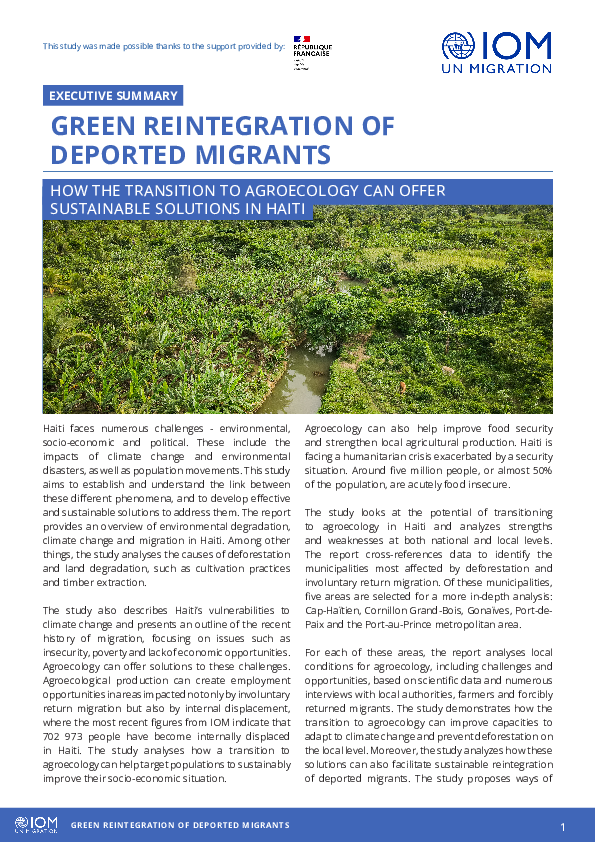-
Countries
-
Data and Analysis
-
Special Focus
-
Crisis Responses
Executive summary - Green reintegration of deported migrants

Contact
dtmhaiti@iom.int
Language
English
Location
Haiti
Snapshot Date
Jul 13 2024
Activity
- Other
Haiti faces numerous environmental, socio-economic, and political challenges, including the impacts of climate change, environmental disasters, and population movements. This study aims to establish and understand the links between these phenomena and to develop effective, sustainable solutions to address them.
The report provides an overview of environmental degradation, climate change, and migration in Haiti. It analyzes the causes of deforestation and land degradation, such as cultivation practices and timber extraction. Additionally, the study outlines Haiti's vulnerabilities to climate change and presents a recent history of migration, focusing on issues like insecurity, poverty, and lack of economic opportunities.
Agroecology presents viable solutions to these challenges. Agroecological practices can create employment opportunities in areas affected by both involuntary return migration and internal displacement. Recent figures from IOM indicate that 702,973 people have been internally displaced in Haiti. This study examines how transitioning to agroecology can help targeted populations sustainably improve their socio-economic conditions.
Moreover, agroecology can enhance food security and strengthen local agricultural production. Haiti is currently experiencing a humanitarian crisis exacerbated by a deteriorating security situation, with approximately five million people—almost 50% of the population—facing acute food insecurity.
The study investigates the potential for transitioning to agroecology in Haiti and analyzes strengths and weaknesses at both national and local levels. It cross-references data to identify municipalities most affected by deforestation and involuntary return migration. Five areas are selected for in-depth analysis: Cap-Haïtien, Cornillon Grand-Bois, Gonaïves, Port-de-Paix, and the Port-au-Prince metropolitan area.
For each area, the report assesses local conditions for agroecology, including challenges and opportunities, based on scientific data and numerous interviews with local authorities, farmers, and forcibly returned migrants. The study illustrates how transitioning to agroecology can enhance local capacities to adapt to climate change and prevent deforestation. Additionally, it analyzes how these solutions can facilitate the sustainable reintegration of deported migrants.
The study proposes ways to strengthen and build upon local knowledge to address deforestation and environmental degradation, capitalizing on best practices. Finally, it presents concrete recommendations for agroecological activities in each selected area, tailored to local circumstances, challenges, and opportunities.
